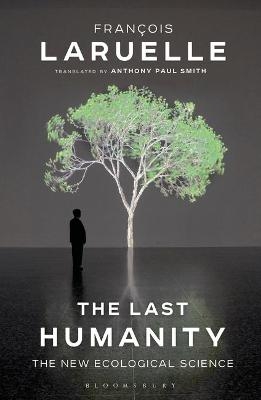
The Last Humanity
The New Ecological Science
Seiten
2020
Bloomsbury Academic (Verlag)
978-1-350-00822-9 (ISBN)
Bloomsbury Academic (Verlag)
978-1-350-00822-9 (ISBN)
In the course of more than twenty works François Laruelle has developed one of the most singular and unique ways of thinking within contemporary philosophy. This volume develops the style of his late work, which has sought to combine the idioms of diverse areas (from the language of quantum mechanics to theology, messianism and Gnosticism) to create non-standard philosophical fictions which further articulate his thinking of radical immanence in relation to wide-ranging themes and concerns.
The focus here is a reassessment of his attempt to rethink what it means to be human. Much of that work has taken place through an engagement with science, politics and religion, but now we see Laruelle confronting the challenge of ecology for his kind of humanism (which he would call a 'non-humanism', meaning a non-standard humanism). This challenge is one of thinking of the ethical demands of other entities within a general ecology. Namely the lives of plants and other vegetation alongside that of animals.
Dealing with the intersections between science and philosophy in current French thought, this book is of particular interest to those concerned with the philosophical innovation and renewal of ecological thought that have influenced ecological theory. The first English translation of a key work from this highly original experimental philosopher, it will surely help cement his place in the firmament of avant-garde French thinkers, from Derrida and Deleuze to Badiou.
The focus here is a reassessment of his attempt to rethink what it means to be human. Much of that work has taken place through an engagement with science, politics and religion, but now we see Laruelle confronting the challenge of ecology for his kind of humanism (which he would call a 'non-humanism', meaning a non-standard humanism). This challenge is one of thinking of the ethical demands of other entities within a general ecology. Namely the lives of plants and other vegetation alongside that of animals.
Dealing with the intersections between science and philosophy in current French thought, this book is of particular interest to those concerned with the philosophical innovation and renewal of ecological thought that have influenced ecological theory. The first English translation of a key work from this highly original experimental philosopher, it will surely help cement his place in the firmament of avant-garde French thinkers, from Derrida and Deleuze to Badiou.
François Laruelle is a French philosopher, formerly of the Collège international de philosophie and the University of Paris X: Nanterre, France.
Foreword
Introduction
Chapter 1: In Search of a Messianic Ecology
Chapter 2: Philosophy’s Degrowth for a Generic Ecology
Chapter 3: The House of Philosophy Is in Ruins
Chapter 4: The Antinomy of Ecology and Philosophy
Chapter 5: The Unification of the Lived-without-Life and Being-in-the-Last-Humanity
Chapter 6: Ecology as Quantum of the Messianic Lived
Conclusion: Ethics Between Ecology and Messianity
| Erscheinungsdatum | 13.11.2020 |
|---|---|
| Übersetzer | Anthony Paul Smith |
| Verlagsort | London |
| Sprache | englisch |
| Maße | 129 x 198 mm |
| Gewicht | 313 g |
| Themenwelt | Geisteswissenschaften ► Philosophie ► Ethik |
| Geisteswissenschaften ► Philosophie ► Philosophie des Mittelalters | |
| Naturwissenschaften ► Biologie ► Ökologie / Naturschutz | |
| ISBN-10 | 1-350-00822-2 / 1350008222 |
| ISBN-13 | 978-1-350-00822-9 / 9781350008229 |
| Zustand | Neuware |
| Haben Sie eine Frage zum Produkt? |
Mehr entdecken
aus dem Bereich
aus dem Bereich


